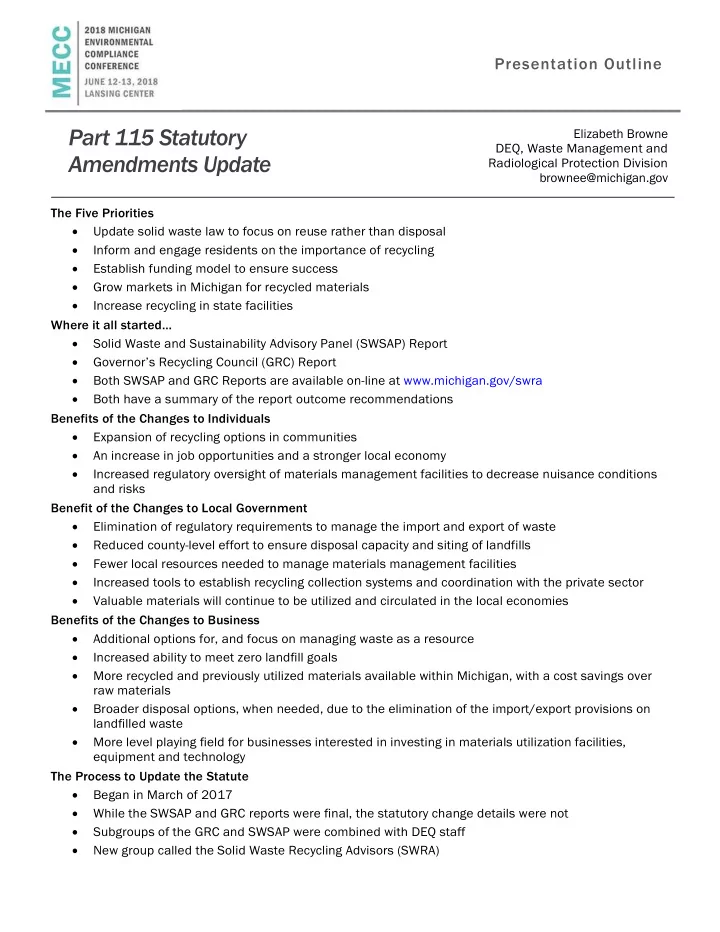

Presentation Outline Part 115 Statutory Elizabeth Browne DEQ, Waste Management and Amendments Update Radiological Protection Division brownee@michigan.gov The Five Priorities • Update solid waste law to focus on reuse rather than disposal • Inform and engage residents on the importance of recycling • Establish funding model to ensure success • Grow markets in Michigan for recycled materials • Increase recycling in state facilities Where it all started… • Solid Waste and Sustainability Advisory Panel (SWSAP) Report • Governor’s Recycling Council (GRC) Report • Both SWSAP and GRC Reports are available on-line at www.michigan.gov/swra • Both have a summary of the report outcome recommendations Benefits of the Changes to Individuals • Expansion of recycling options in communities • An increase in job opportunities and a stronger local economy • Increased regulatory oversight of materials management facilities to decrease nuisance conditions and risks Benefit of the Changes to Local Government • Elimination of regulatory requirements to manage the import and export of waste • Reduced county-level effort to ensure disposal capacity and siting of landfills • Fewer local resources needed to manage materials management facilities • Increased tools to establish recycling collection systems and coordination with the private sector • Valuable materials will continue to be utilized and circulated in the local economies Benefits of the Changes to Business • Additional options for, and focus on managing waste as a resource • Increased ability to meet zero landfill goals • More recycled and previously utilized materials available within Michigan, with a cost savings over raw materials • Broader disposal options, when needed, due to the elimination of the import/export provisions on landfilled waste • More level playing field for businesses interested in investing in materials utilization facilities, equipment and technology The Process to Update the Statute • Began in March of 2017 • While the SWSAP and GRC reports were final, the statutory change details were not • Subgroups of the GRC and SWSAP were combined with DEQ staff • New group called the Solid Waste Recycling Advisors (SWRA)
2018 MECC Presentation Outline Page 2 • SWRA was challenged with taking the high-level recommendations and identifying statutory updates to implement the recommendations o Updated version 6 of draft law changes were received from Legislative Service Bureau May 11, 2018 o Version 6 of the draft statutory revisions is currently under review by the SWRA Changes to the “Traditional” Solid Waste Program • Processing Plants and Transfer Facilities are combined under one permit and license umbrella to better reflect current solid waste management realities • Updated post-closure section, including functional stability evaluations and the introduction of a custodial care concept • Financial Assurance requirements were updated to better reflect the true cost of closing a facility • The county planning process has been simplified o Solid waste import/export restrictions have been eliminated o In many cases, compliance with local zoning requirements will be the main siting criteria for a facility Materials Utilization Facilities • Updated and Brought Under Part 115 authority • Material utilization facilities include: o Composting o Anaerobic Digesters o Materials Recovery Facilities o Innovative Technologies or Practices for Waste Utilization Authorization Levels - Notification • All Waste Diversion Centers • Smaller Material Recovery Facilities, Compost Facilities and Anaerobic Digesters • Requires an annual notification on a form and format designated by the Department Requirements for Notifiers • Comply with local zoning • Do not create nuisance conditions • Comply with water quality standards • Report on a yearly basis the amount of material managed at the site Authorization Levels - Registration • Mid-sized Material Recovery Facilities, Compost Sites and some Anaerobic Digesters • Submission of a Registration Form every 5 years on a form and format provided by the Department • Submission of certain materials management data annually on a form and format provided by the Department • Application fee of $750.00 Requirements for Facilities that Register • Comply with local zoning • Do not create nuisance conditions • Comply with water quality standards • Report on a yearly basis the amount of material managed at the site • Participate in an annual inspection by the DEQ
2018 MECC Presentation Outline Page 3 Authorization Levels – General Permit • Large Material Recovery Facilities, Compost Sites • Anaerobic Digesters that accept off site, source separated materials • Innovative Technologies or Practices • Submission of a Permit Application every 5 years on a form and format provided by the Department, Financial Assurance requirements, annual inspection by the DEQ • Submission of certain materials management data annually on a form and format provided by the Department • Application fee of $2,500.00 Requirements for Facilities that need a General Permit • Must meet local zoning or be consistent with the County Materials Management Plan • Must develop and submit plans for review and approval that may include: o Operations plan o Site Plan o Marketing plan o Training plan Materials Management Planning • Broadened to address managed materials versus solid waste • Regional approaches are encouraged • No longer have import/export authorizations • Local zoning is the “siting process” for most facilities • Updated siting process • No new “greenfield” landfills or incinerators unless a need is shown by the County. Funding Considerations • Grants to Counties or other Planning Entities to fund the development and management of Materials Management Plans ($5 Million) • Competitive grants for Outreach and Education for citizens and communities to encourage increased recycling and to reduce material contamination ($8 Million) • Aid for Market Development to attract businesses using recycled materials and to better support business-to- business recycled materials exchanges ($2 Million) • Additional technical assistance from the DEQ to address a re-invigorated planning process and to manage the additional facilities that will be regulated Stay Connected • Find additional information at www.michigan.gov/swra
Recommend
More recommend